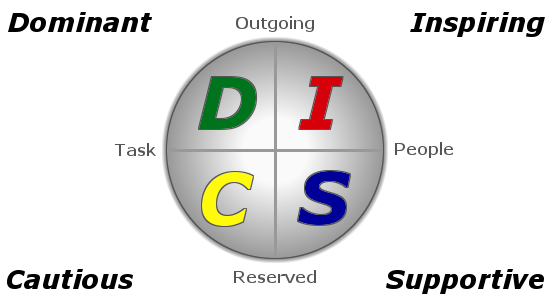I was five minutes into trying to figure out what the acronym stood for when I started to wonder which of Bolton's personality types made the DISC website. I later, after taking the personality test and trying to find out more about it, stumbled across their blog link and was able to find out more about it. Their foundation for the test came from Harvard psychologist William Moulton Marston and his theory that people develop self-concepts based on one of four factors: Dominance, Inducement, Steadiness, or Compliance. You can see how that is reflected in the actual elements that they chose to make up DISC in the graphic below.
I took the 12 question test as I was curious as to what it would say my 'at work' style was (you can take the test here if you're so inclined: https://discpersonalitytesting). The questions reminded me a bit of Bolton's questions, but instead of basically being a true/false questionnare, you began to very clearly see exactly what result you were going to get as you answered the scenario-specific questions, since their four personality types were that easily distinguishable.
The theoretical basis for the questions more accurately fits being a behavioral style test, and I found the general break down into the four categories to be pretty similar to Bolton's, but not as forthcoming. For $28 you'd expect a bit more than knowing if you're introverted/extroverted and if you're task/people oriented. The main difference I saw with taking this quiz is you are answering every question for yourself, and generally couched in "I'm doing this because __ emotions" type wordings. Each of the 12 questions has "while completing x task, I'm most often..." and a counterpart that is "I'm least often..." and unlike Bolton's test, you can be pretty firmly wedged between two quadrants. Overall, Bolton's theory was far more insightful to me than the DISC model, which made me think of a Meyer's Briggs test for purely your work persona.
If you're wondering why the name Marston sounds familiar... he invented the polygraph. He also penned Wonder Woman under the name Charles Mouton.
I took the 12 question test as I was curious as to what it would say my 'at work' style was (you can take the test here if you're so inclined: https://discpersonalitytesting). The questions reminded me a bit of Bolton's questions, but instead of basically being a true/false questionnare, you began to very clearly see exactly what result you were going to get as you answered the scenario-specific questions, since their four personality types were that easily distinguishable.

The theoretical basis for the questions more accurately fits being a behavioral style test, and I found the general break down into the four categories to be pretty similar to Bolton's, but not as forthcoming. For $28 you'd expect a bit more than knowing if you're introverted/extroverted and if you're task/people oriented. The main difference I saw with taking this quiz is you are answering every question for yourself, and generally couched in "I'm doing this because __ emotions" type wordings. Each of the 12 questions has "while completing x task, I'm most often..." and a counterpart that is "I'm least often..." and unlike Bolton's test, you can be pretty firmly wedged between two quadrants. Overall, Bolton's theory was far more insightful to me than the DISC model, which made me think of a Meyer's Briggs test for purely your work persona.
If you're wondering why the name Marston sounds familiar... he invented the polygraph. He also penned Wonder Woman under the name Charles Mouton.
Harris, G. (2016, August 23). What is the DISC Model? Retrieved January 24, 2018, from https://discpersonalitytesting.com/blog/what-is-the-disc-model/.
PeopleKeys, Inc. (n.d.). William M. Marston. Retrieved January 24, 2018, from https://discinsights.com/william-marston/.
Comments
Post a Comment